A lot of people wish for their backyards to be as beautiful as their homes. For that purpose, choosing the best lawn grass is necessary. When it comes to beautiful lawn grass species, Fescue vs Bermuda grass is a pretty common debate.
Bermuda does better in high heat and drought if watered properly. Being a warm-season grass, it is the better choice for hot areas. With a strong root system, it is a good choice if you are concerned about durability. Fescue is better at handling long drought periods without getting dormant. It is a cool-season grass and is best suited to cold areas. If you want something that has a clean look and long-term durability, then Fescue is better.
Contents
Comparison Fescue vs Bermuda Grass
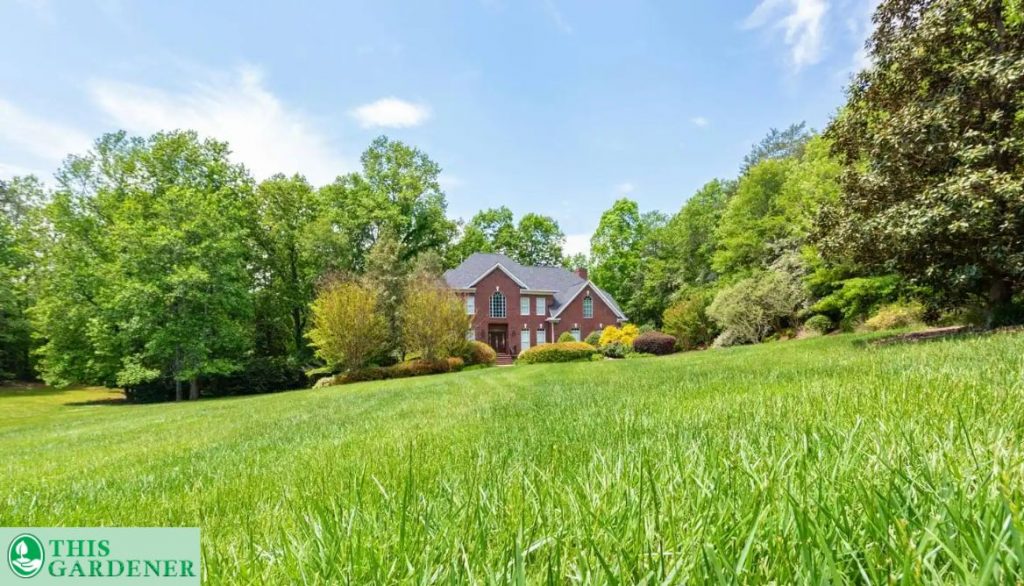
- Better is better in hot weather whereas Tall Fescue is more suited for cooler climates
- If shade tolerance and rainy weather are considered then Fescue comes out on top as Bermuda is not a good choice in such conditions
- The blades of both Fescue and Bermuda are broad and dark green in color
- Bermuda has hairs on the leaf sheath whereas Fescue has none
Differences Between Fescue & Bermuda
The following differences set them apart:
Parameters | Fescue Grass | Bermuda Grass |
Season | Primarily, a cool season grass | Primarily, a warm season grass |
Heat | Amazing Tolerance towards shade and heat | High heat resistance |
Resistant to Diseases | Highly resistant to diseases | Strong Root System |
Growth Rate | Excellent Growth Rate | Fast Growth Rate |
Maintenance | Need Average Maintenance | Need Low Maintenance |
What is Fescue grass?
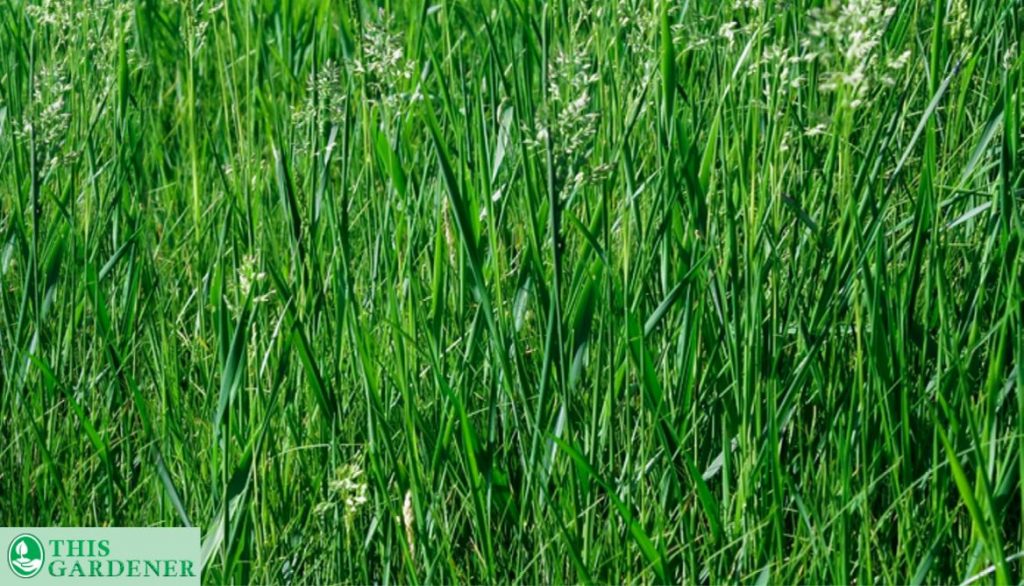
Tall Fescue grass is really popular among lawn owners because it is very adaptable. As it comes with a higher tolerance towards different environmental conditions, it is a suitable choice for a lawn. Due to a high germination rate than bluegrass, it is one of the most common choices for lawn grass.
Identifying features
- Narrow Grass Blades
- More of a Coarse texture
- Rich Darkish Green Color
- Hight Climate Tolerance
- Establishes quickly due to quick germination
What is Bermuda Grass?
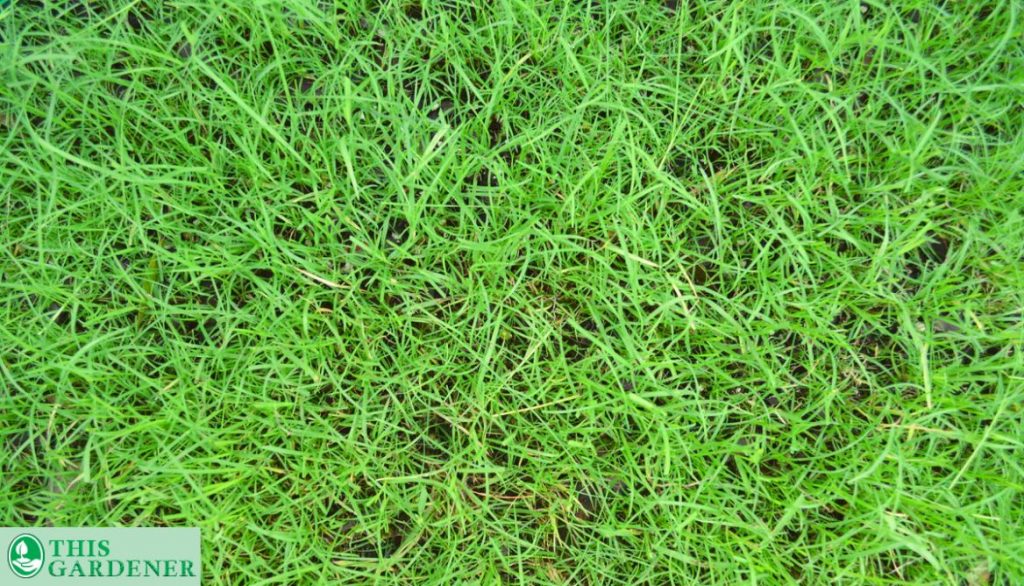
This turf grass is primarily suited to warmer areas. Similar to the fescue, Bermuda is also quite reputable for its high tolerance. Bermuda lawns are great as they can easily recover if they get damaged. Durability is also high because of a root system that goes deep.
Identifying features
- Bluish-green blades
- It tends to form big patches
- Visible stolons
- The texture is somewhere between medium and fine
- It has broad grass blades
Comparing Fescue & Bermuda
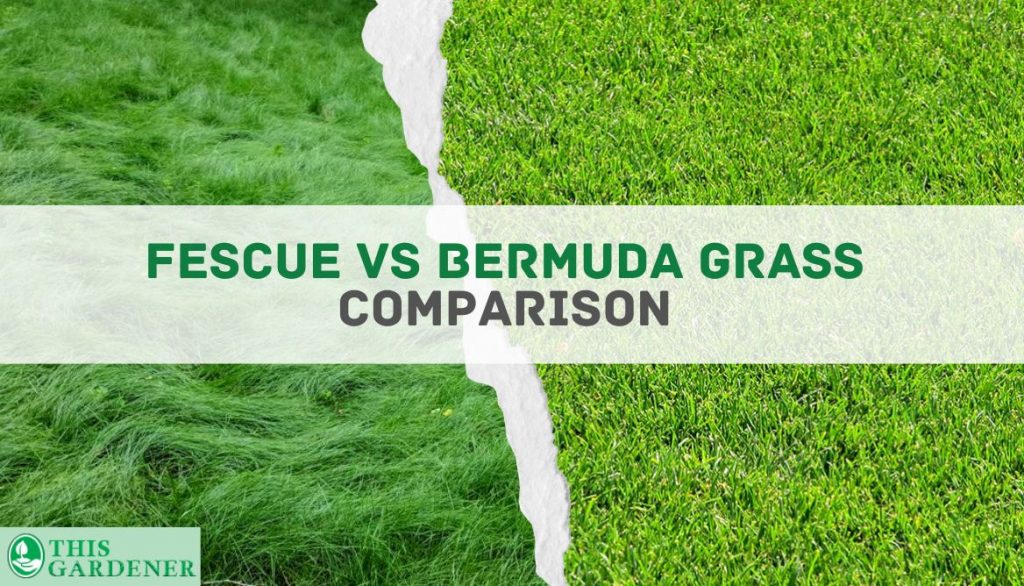
Comparing fescue and Bermuda isn’t very simple as both grass species are completely different from one another. Where one prefers a cold climate, the other one likes hot weather. There are good and bad things about both grass species but are suitable for different environments. We have made a list of different aspects on which we are going to compare both types of grass so that you can easily decide the best one for yourself.
Appearance
Both kinds of grass have a good appearance to them and will make your lawn beautiful no matter the one you choose. Tall Fescue has narrow blades but a much more darker green color that looks stunning.
If you take a closer look at Bermuda then you will be able to spot the little hairs on the grass blades. This grass type also has green color but with a bluish hue to it. Due to the hairs, Bermuda can also appear to be blurry from afar.
Weeds, Growth, and Sod formation
Tall Fescue is pretty solid when it comes to weeds. It is able to control most of the weeds with no problem. The growth rate is high especially during early spring and winter. It spreads through tillers and grows in the form of clumps.
With the stronger root system, Bermuda is able to flush out any weeds. If you are looking for fast-growing grass then it doesn’t get any better than Bermuda. The sod is formed by the Bermuda grass seed, stolons, and rhizomes.
Best Uses
The best use case for Tall Fescue is areas with high traffic. Due to the higher tolerance, it does better in extreme conditions. Low shade doesn’t affect it that much and also the maintenance requirement is low. Due to all these factors, you will commonly see this grass is most golf courses.
Bermuda grass seed is best in areas with average traffic and hot weather. This grass variety will perform flawlessly in such conditions. It is also suitable as a pasture grass as well.
Soil Types and pH Needs
A great thing about fescue grass is that it has a bigger pH range than most grasses with the ph ranging between 5.5-7.5. There is no specific requirement for any soil. It performs great in most soils but appreciates a lot of rain. It is quite durable and sticks firmly to the ground in rough areas as well.
Bermuda grass isn’t as versatile as fescue grass. The thing about Bermuda is that it needs a lot of drainage with a pH ranging from 6-7. If the soil has a high pH then it will negatively affect the growth rate of Bermuda grasses.
Water Needs
The water need for both of these amazing grasses is quite similar at 1″ water/week. If the weather is hot then Bermuda grass seed performs really well in drought and won’t lose its color if it is getting some amount of water.
If you are living in an area that sees heavy rainfall then tall fescue grass is going to be the best choice for you. It is great because it is not harmed by standing water and can withstand a long drought period with ease.
Fertilizer requirements
1 pound of nitrogen fertilizer is great for tall fescue grass. If you are unaware of the soil condition then it is best to use a 4-1-2 fertilizer for the best effect.
Bermuda grass sees the best results if you have a 21-0-0 fertilizer. There shouldn’t be anything other than nitrogen in the fertilizer.
Sun, Shade, and Temperature Requirements
Fescue grass thrives excellently in shade. Full sun is not good for it as it doesn’t do well in high temperatures. When the temperature is above 90F then it can burn the tips of this grass. However, cool weather is the most ideal for a fescue lawn.
Bermuda is completely opposite to Fescue as it prefers a lot of sunlight to grow properly and give a fine look. If the temperature falls too low then Bermuda grass starts to suffer as it doesn’t do well in shade and in low temperatures.
Durability
Deep roots ensure high durability for grasses. Tall fescue lawns are not only good in high-traffic areas but due to the higher adaptability to different climates, make it a more ideal choice.
When the temperature is high, Bermuda grass is really durable. With its higher heat tolerance, it can withstand warm climates longer. But prolonged heat can also adversely affect this grass type as well.
Common Pests and Diseases
Webworms and aphids affect both grass types in a similar manner. The slow recovery rate of the Bermuda grass makes it more susceptible to digging animals. This is a thing you need to look out for.
Bermuda is not safe from diseases as well. It can get root rot, mildew, etc from water. Tall fescue with its deep root system isn’t completely safe and can get crown rust in humid climates. So, both Bermuda and fine fescue can get fungal diseases.
Mowing Needs
If you have a short lawn then Bermuda grass varieties are going to suit you the best. The mowing height of Bermuda is about 2″ but a bit higher or lower height also works fine as well. The mowing requirement for bermudagrasses is about once or twice per week.
Tall fescue lawns are a bit longer and thus the mowing height is anywhere between 2″ and -3.5″. With cool-season grasses, it is better to let them grow a bit. It helps in retaining the moisture and prevent any harm. Mowing the fescue grass once per week is more than enough.
Cost of Maintenance
Tall fescue is a bit cheaper than Bermuda grass and thus the maintenance cost is also low. So, if you are looking strictly at the cost of the planting and maintenance, then it will be a bit better but not by much. Both of them cost around $9 to $13 for a pound.
Tall Fescue Grass vs Bermuda: Which Option is Right for You?
If you still aren’t sure which one is the right grass seed for you, then we will further simplify it by dividing it into three sections and giving our conclusion.
Choosing the Best Option for Climate
Bermuda grasses are warm-season grasses that prefer full sun and are not shade-tolerable. Fescue is highly shade-tolerant and prefers a bit of sun.
Growing zones
The best growing zones for Bermuda are the ones with a hot climate and cold climates for fescue.
Summary: If you live in a hot area then go for Bermuda otherwise choose Tall Fescue.
Choosing the Best Option Based on Maintenance
Bermuda grass seed and fescue both have really low maintenance requirements but Fescue can survive weeks of drought.
Summary: Tall fescue is a bit easier to maintain due to its high drought tolerability
Choosing the Best Option Based on Susceptibility to Pests and Disease
Fescue vs Bermuda isn’t a thing when it comes to susceptibility to pests and diseases. Bermuda gets affects by a lot more diseases and has slow growth.
Summary: In our opinion, Tall Fescue is the obvious choice as it is affected by a few diseases.
Similarities between Fescue vs Bermuda
Similar Appearance
Both fescue and bermudagrass have green blades. The texture is a bit different but the color more or less is the same.
Low Maintenance
None of the grasses require a lot of maintenance. That is why most lawns use either one of these.
Same Water Needs
Even though the grasses have a lot of differences but the water requirement is identical for both of them.
FAQs
Is Bermuda or Fescue easier to maintain?
Due to its high drought tolerance, tall fescue is easier to maintain.
How do you tell the difference between Fescue and Bermuda?
Bermuda has hairs on the blades which Fescue doesn’t have. So you can easily distinguish between the two.
Can you mix Bermuda grass with tall Fescue?
No, Bermuda grass can’t be mixed with Tall Fescue at all.
Will Bermuda grass choke out Fescue?
Yes, due to the growing rhizomes and stolons, Bermuda will eventually choke out the Fescue.
Does tall Fescue look like Bermuda grass?
Without a doubt. Tall fescue does have a similar appearance to Bermuda grass. It is probably due to the same color.
Does Fescue make a good lawn?
Absolutely, tall fescue makes for an excellent lawn. It is mainly due to its increased tolerance and low maintenance needs.
What is special about Bermuda grass?
It is known for its high heat tolerance and resilience. That is why it is widely used by a lot of people.
Will Bermuda grass choke out other grass?
Due to the ever-growing stolons and rhizomes, Bermuda can choke out other grasses.
What grass seed will overtake Bermuda?
For overtaking Bermuda, you need a cool season grass like ryegrass.
Does Fescue go dormant during the summer?
If there is high heat, then tall fescue grass will go dormant very quickly. This is because it prefers a cooler climate.
Conclusion
When deciding between the best grass for your lawn, it is important to consider factors like appearance, durability, weed growth, tolerance, and maintenance requirements.
The most important factor is to consider your living area. If you living in hot areas should consider Tall Fescue while the ones living in a cooler climate should go with Bermuda.
So, which grass are you going to use for your lawn? Let us know your answer in the comments and also share your thoughts and feedback.
References
- All You Need to Know About Tall Fescue (pennington.com)
- Common Bermudagrass | Purdue University Turfgrass Science at Purdue University
- https://www.dpi.nsw.gov.au/__data/assets/pdf_file/0008/166094/p256.pdf
- Tall Fescue Maintenance Calendar | Home & Garden Information Center (clemson.edu)
- All About Bermuda Grass Sod – The Turfgrass Group Inc
- How to Get Potatoes to Sprout Eyes: Detailed Growing Guide with 3 Options - July 31, 2023
- Weight of a Medium Potato: Revealed in Detailed Guide - July 29, 2023
- Maris Piper Potatoes: 9 Substitutes You Should Know About - July 27, 2023
Hello! I’m Jessica Zander, a garden coach and consultant based in the Boston area (zone 6b), offering virtual consultations across the country and Canada.
I’ve been passionate about gardening since the early 1990s, and in 2022, I launched You Can Do It Gardening to empower individuals to feel more confident in their gardening endeavors.
Following a 30-year career in nonprofit finance and operations, I transitioned out of that field in mid-June of 2023 due to the growing demand for coaching services. Interestingly, my years of presenting financial statements to boards and finance committees proved to be valuable experience for teaching people about gardening! I enjoy sharing skills, providing guidance and suggestions, and collaborating efficiently with clients to make significant improvements to their outdoor spaces, both small and large. I also regularly teach at the Arlington Continuing Education and Cambridge Adult Education.
My approach is direct and practical, akin to Mary Poppins, but tailored to your garden. Clients find satisfaction in saving money and taking pride in their own gardening achievements.

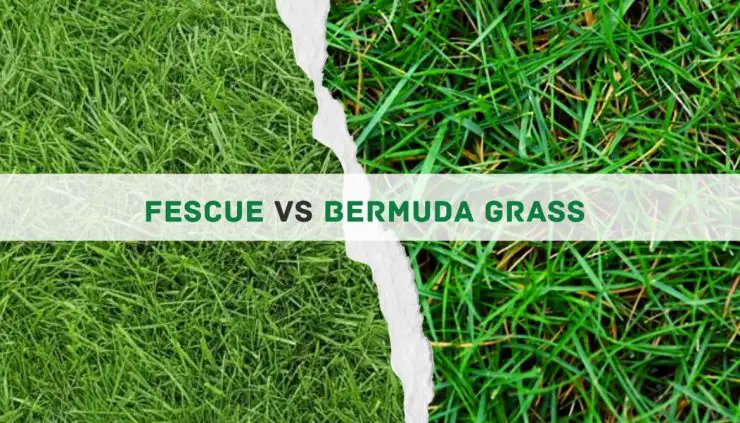
Add comment